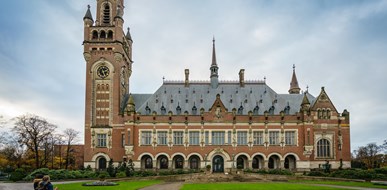[New podcast] Episode 4: The Peace Palace and the ‘building’ of the international community
Published 23 June 2023
@Hilko Visser - The International Peace Palace in The Hague. The palace officially opened on 28 August 1913; it was built to provide a home for the Permanent Court of Arbitration, created to end war by the Hague Convention of 1899. The Peace Palace also houses the International Court of Justice (ICJ).
What transnational, bureaucratic and monetary considerations (and bickering) were at play in the construction of the Peace Palace in The Hague? And: what role did a curious ritual of gift-giving play in constituting the international community? In a brand new episode of The Hague Courts Dialogue Series podcast, Tanja Aalberts and Sofia Stolk share the findings on their research on the ‘building’ of the international community and the Peace Palace as its new home.
The Peace Palace in The Hague is much more than a mere venue where international law is practiced. Considered an iconic symbol of international law and justice, and initiated after the 1899 Peace Conference, it provided a material home for the emergent international community. According to researchers Tanja Aalberts and Sofia Stolk it 'helped to sing this international community into existence'.
Gift-giving to constitute relationships
In the podcast episode 'The Peace Palace and the 'building' of the international community', Aalberts and Stolk look at gift-giving as a way to constitute relationships, and they analyse how three sets of gifts were crucial to (the) building (of) the emergent international community. The first was to find a proper site (as a gift from the Dutch government); then to secure Andrew Carnegie’s financial gift; and then to collect materials and artworks donated by states as gifts to the Palace.
But each of these gift-givings involved a complex web of public and private transnational actors, temporalities, and bickering over nitty gritty details as the conditions of possibility for giving and receiving gifts, and constituting the international community.
Listen now to episode 4: The Peace Palace and the 'building' of the international community with Prof. Tanya Aalberts and Dr Sofia Stolk
About the Hague Courts Dialogue podcast series
In the Hague Courts Dialogue series, researcher and podcast host Carl Lewis has short conversations with legal experts on cases that have been brought before the international courts and tribunals based in The Hague, such as the International Court of Justice (ICJ) or the International Criminal Court (ICC). The podcast series focuses on contemporary matters of international law raised in ongoing cases, as well as the more conceptional concerns which a pending case may bring up. The series will also pay attention to international legal questions that are raised in domestic decisions, such as those made by the Dutch Supreme Court.
The Hague Courts Dialogue Series Podcast is available on Apple, Spotify and most podcast platforms as well as our website.
Subscribe now to The Hague Courts Dialogue Series podcast, brought to you by the Asser Institute, centre for international and European Law.
Read more
Building (of) the international community: a history of the Peace Palace through transnational gifts and local bureaucracy
The Peace Palace in The Hague is more than a mere venue where international law is practiced. Initiated after the 1899 Peace Conference it provided a material home for the emergent international community. Together with Tanja Aalberts, Sofia Stolk focused on the Peace Palace as ‘a material home' by tracing the materialising process of the grand international ideal of ‘peace through justice’ of the Hague-based building, in their article Building (of) the international community: a history of the Peace Palace through transnational gifts and local bureaucracy (Open Acces - London Review of International Law).
This topic is part of the Asser Institute research strand: ‘Public interest(s) inside/within international and European institutions and their practices’. which zooms in on how public interests shape and are shaped in the institutional practices of international and European courts, such as the International Court of Justice and the European Court of Human Rights, as well as organisations such as the United Nations and the World Trade Organization.
